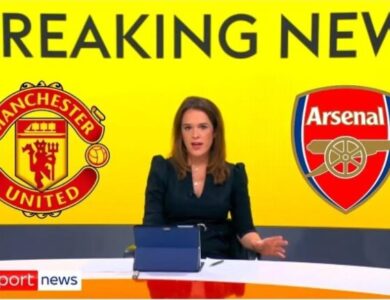UEFA has released the VAR audio for Arsenal not given a penalty after a rough tackle in the die minute against Bayern Munich.

In a gripping turn of events reigniting discussions on the implementation of VAR (Video Assistant Referee) in football, UEFA has taken an unprecedented step by unveiling audio recordings pertaining to a controversial penalty incident during a match between Arsenal and Bayern Munich. This incident unfolded in the dying moments of a crucial Champions League encounter, leaving both fans and analysts eager for clarity and responsibility.
The scene was set for a tense clash between two European powerhouses, as Arsenal and Bayern Munich battled for supremacy. With the match approaching its conclusion, anticipation reached a crescendo, only to be disrupted by a contentious moment that sent shockwaves through the footballing community.
In the midst of the action, a rough challenge inside Bayern Munich’s penalty area prompted fervent appeals from Arsenal players and fans for a penalty kick. The referee’s decision not to award the penalty ignited a storm of debate and speculation, with emotions running high and the outcome hanging in the balance.
UEFA’s release of the VAR audio recordings provides a rare glimpse into the behind-the-scenes deliberations, offering insight into the intricate decision-making process as it unfolded in real-time. As fans analyze the audio transcripts, they are drawn into a world of referees, VAR officials, and critical moments of judgment.
The recordings capture the intense emotions and meticulous scrutiny that accompany pivotal decisions in elite football. From the initial incident on the field to the comprehensive review by the VAR team, every stage of the process is laid bare for scrutiny.
As VAR officials meticulously analyze the footage, weighing evidence and considering the consequences for the match’s outcome, tension mounts with millions of eyes eagerly awaiting the final decision.
In the aftermath of the release, reactions vary widely and are impassioned. Some supporters feel vindicated by the audio evidence, seeing it as validation of their team’s grievances and highlighting the need for greater transparency in refereeing decisions. Others, however, remain skeptical, citing lingering doubts about the effectiveness of VAR.
Regardless of individual allegiances, one thing is clear: the release of the VAR audio has sparked a fresh discussion about the role of technology in football officiating. As the sport adapts to the modern era, questions about fairness, accuracy, and accountability will continue to shape its future for years to come.




